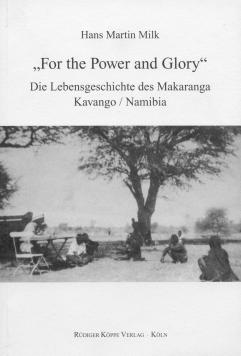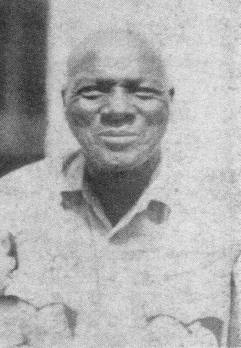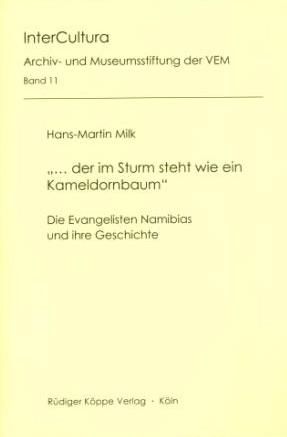


„For the Power and Glory“
Die Lebensgeschichte des Makaranga, Kavango/Namibia
Author: Hans-Martin Milk. Series edited by: Reinhard Klein-Arendt.
Series: Precolonial and Early Colonial History in Africa Volume 2
2004201 pp.
3 maps, 11 b/w photos, 1 facsimile reproduction, 1 diagram, 2 tables
Text language(s): German
Format: 160 x 240 mm
420 g
Paperback
€ 39.80
Buy '„For the Power and Glory“' as a downloadable PDF document directly from our online shop »
Order '„For the Power and Glory“' as print edition »
A Kavango proverb says: A sharp tongue can strike harder than a stick.
This motto characterizes the way of Makaranga (c. 1887–1955) – a man who was able to develop from a young transportation worker into a mighty and respected administrative officer through his manifold proficiency in languages and constant positional changes.
Makaranga was a wanderer between the borders of language, culture, tradition and political courses. That is what today makes him that modern and interesting. Postcolonial theory, like it was developed by Homi K. Bhabha, Gayatri C. Spivak and Edward Said, casts a new look on postcolonial and colonial circumstances. Following the example of Makaranga’s biography, many concepts of cultural hybridity, of ambivalence and dominance, which succeed the typical dichotomous oppositions of tradition and modernity, of colonizer and colonized or of intact and destroyed cultures, can be discussed.
The story of Makaranga testifies a lived diversity and completely breaks with the idea of the ethnically anchored African on the one hand and the African lost between tradition and modernity on the other. While in many disciplines african debates were for a long time determined by the question for an african identity, voices increased which doubt these rigid concepts of identity. Makaranga integrates diversity without difficulty – a performance which is more than ever necessary.
The present study is an attempt to write Makaranga’s story as it can be presented through small hints found in official files, stories from Kavango people, missionary literature, and entries in church registers. These different contributions result in a complete portrait of a man who over almost 40 years of Kavango history translated countless official instructions, authorized announcements, bureaucratic statements, governmental threats, judicial proceedings and solemn speeches – without ever having written anything personal about himself. In the absence of these authentic sources his story only exists of a string of impressions and images.
Under these links you will find publications by the author and further studies of the history and of missionary work in Namibia and South Africa:
Accompanying material:
- “Healing the Land” – Kaulinge’s History of Kwanyama
(ISBN 978-3-89645-051-7 ) - “We Thought we would be Free ...”
(ISBN 978-3-89645-057-9 ) - “When War came the Cattle slept”
(ISBN 978-3-89645-049-4 ) - „… der im Sturm steht wie ein Kameldornbaum“
(ISBN 978-3-89645-452-2 ) - „Widerstand und Gottesfurcht“
(ISBN 978-3-89645-059-3 ) - Der Caprivizipfel während der deutschen Kolonialzeit 1890–1914
(ISBN 978-3-89645-050-0 ) - Die südafrikanische Militärverwaltung (1915–1920) und die frühe Mandatszeit (1920–1936) in der Kavango-Region / Namibia
(ISBN 978-3-89645-360-0 ) - Ein Leben im Dienste der Afrikanistik
(ISBN 978-3-89645-631-1 ) - Hendrik Witbooi – ein Leben für die Freiheit
(ISBN 978-3-89645-315-0 ) - Herrschaft, Macht und Einfluß
(ISBN 978-3-89645-359-4 ) - The Kavango Peoples in the Past
(ISBN 978-3-89645-353-2 ) - The Mbukushu in Angola
(ISBN 978-3-89645-350-1 ) - Trommeln in der Kirche
(ISBN 978-3-89645-917-6 )
Cross-reference:
- „S’ist ein übles Land hier“ – Zur Historiographie eines umstrittenen Kolonialkrieges
(ISBN 978-3-89645-361-7 ) - Alles unter Kontrolle
(ISBN 978-3-89645-402-7 ) - Kurze Geschichte der Vereinten Evangelischen Mission – Short History of the United Evangelical Mission
(ISBN 978-3-89645-753-0 ) - Manasse Tjiseseta, Chief of Omaruru, 1884–1898, Namibia
(ISBN 978-3-89645-055-5 ) - Mission und Apartheid
(ISBN 978-3-89645-758-5 ) - Mission und Apartheid
(ISBN 978-3-89645-754-7 ) - Sisters from Two Worlds
(ISBN 978-3-89645-752-3 )
Reviews
Ulrich Oberdiek in Anthropological Abstracts, www.anthropology-online.de/Aga06/0079.html, 1
Milks Studie ist ein erfrischendes Forschungsergebnis sorgfältiger und interessanter Recherche, von deren Art man sich im Kontext der afrikanischen Kolonialforschung weitere ähnliche Detailuntersuchungen wünscht. Sie weisen darauf hin, daß zwischen Unterdrückung und Opportunismus, zwischen Täter und Opfer immer noch der schmale Grat des Menschlichen existiert, den Genie, Witz und Mut durchaus wirksam zu überbrücken vermögen.
Andreas Vogt in Jahrbuch für Europäische Überseegeschichte, 7/2007, 340-342
| « back | Print version | [top] |
 Books
Books Audio
Audio Biographies
Biographies Series
Series Festschrifts
Festschrifts Journals
Journals